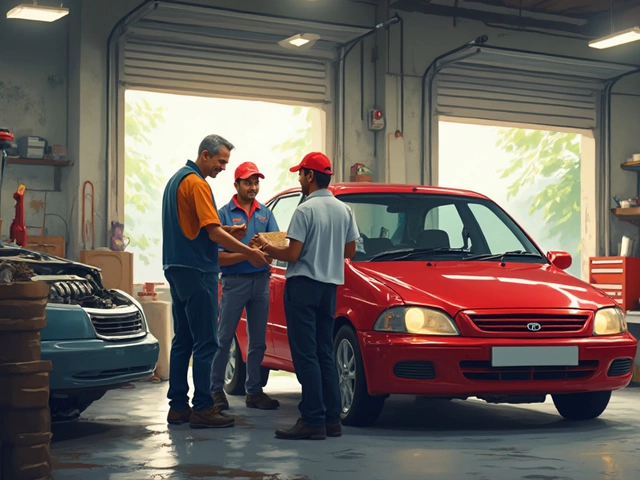Ever wondered how much cash you need to throw down when getting your car tuned? It's a bit of a mixed bag, especially when we chat about exhaust systems. Car tuning is like making your car the best version of itself, but it can put a dent in your wallet if you're not sure what you're doing.
So, what's tuning really about? In simple terms, it's giving your car a little extra edge. For some folks, that means tweaking the engine. For others, it might be beefing up the exhaust system to not only get a better sound but also improve gas flow.
The cost isn't fixed. It depends on what you want done and whether you're after a basic adjustment or a full-on transformation. If you're looking into exhaust changes, you could be looking at anything from a couple of hundred bucks to a few thousand. You might think that's a bit of a price hop, and you're right—there's a lot that factors into it.
Stick around and we'll chat more on why these costs vary, and how you can keep the price in check while getting the roar from your exhaust you're after. We've got tips and insights to help you decide if a tuning service really gives you bang for your buck. Whether you're into cars as a hobby or just want your ride to run smoother, you're in the right place.
- Understanding Car Tuning Basics
- How Exhaust Systems Affect Performance
- Cost Breakdown of Tuning Services
- Is It Worth Tuning Your Car?
- Tips for Cost-Effective Tuning
Understanding Car Tuning Basics
Alright, let's break down the world of car tuning. Tuning is essentially the process of tweaking your vehicle's engine control unit (ECU) to improve performance, fuel efficiency, or a specific driving feel you want. For those not quite in the know, it's like giving your car's brain a software upgrade.
You might wonder, why bother? A lot of folks are after better fuel economy or a bit more oomph in the acceleration department. Sometimes, it’s just about making sure that the car purrs the way you like it. And don't get me started on exhaust systems—they’re a popular target for tuning because they can massively impact how your car sounds and behaves.
Different Types of Tuning
There are a ton of ways to tune your car, and they don't all cost the same. Here are a few options:
- Chip Tuning: This involves tweaking the ECU with a new chip to boost engine performance. It's one of the simpler, more affordable options.
- Dyno Tuning: Involves testing your car's performance on a dynamometer—fancy, right? It helps mechanics get real-time data to make precise adjustments.
- Exhaust System Tuning: Changing up your exhaust can improve airflow, giving you more power and less noise restriction. It might involve swapping out parts like the muffler or catalytic converter.
Tools of the Trade
If you’re thinking of getting into car tuning, here's what you need:
- OBD-II Scanner: This little gadget reads your car's computer, helping you monitor engine stats and diagnose issues.
- Performance Software: Various software programs let you adjust the ECU settings. Be careful; messing around with these without knowing what you’re doing can harm your engine.
Lastly, always consider the cost. A quick tweak could run you a few hundred dollars, but diving deep might set you back thousands. The key is to know what you want and plan wisely to get the car tuning benefits without blowing your budget.
From your car’s heart—the engine—to how it breathes through the exhaust system, understanding these basics can help you make informed decisions. Remember, each tweak can change how your vehicle performs or even how long it lasts. So, now you know what to consider before handing over the keys for a tune-up.
How Exhaust Systems Affect Performance
Getting the lowdown on exhaust systems can really help you understand why they're crucial for your car's performance. The primary job of an exhaust system is to guide waste gases away from the engine. It's not just about dumping fumes—there's a whole lot more to it.
Boosting Horsepower
A high-quality exhaust system can significantly increase your vehicle's horsepower. By improving the flow of exhaust gases, it reduces back pressure on the engine, letting it breathe easier. This means your engine doesn't have to work as hard, translating into more power when you hit the gas pedal.
Improving Fuel Efficiency
No one likes watching that fuel gauge drop. With the right exhaust setup, you could see a bump in fuel economy. A smoother exit route for gases helps your engine run more efficiently, burning less fuel in the process.
Enhancing Sound
Let's be real—some folks tune their exhaust just for the sound. Installing a performance exhaust system can give your car that deep, throaty roar. It’s not about just making noise, but achieving an aesthetic that resonates with car enthusiasts.
Types of Exhaust Systems
Not all exhaust systems are molded the same. Here’s a quick rundown:
- Cat-Back: Runs from the catalytic converter to the rear, offering a blend of performance and sound increase.
- Axle-Back: They're similar to cat-back but only start at the rear axle.
- Header-Back: This involves replacing the exhaust from headers all the way back, significantly an upgrade, but also pricier.
It's good to weigh these options based on your ride and what suits your needs best. Remember, it's not about slapping the loudest pipes; it's about the right combination that enhances performance.
Considerations for Installation
When thinking about a new exhaust system, keep a few things in mind:
- Compatibility: Not all exhausts fit all cars. Ensure it matches your model and style.
- Legal Requirements: Noise and emission regulations can vary by region, so stay informed to avoid fines.
- Professional Installation: While some might tackle it themselves, professional installation ensures everything fits snug and performs as expected.
Thinking about these factors can help you balance performance boosts while keeping everything street-legal and efficient.

Cost Breakdown of Tuning Services
When it comes to car tuning, especially if you're looking at exhaust systems, understanding the costs can save you from surprises. Let’s break it down so you know what you're getting into.
Basic Tuning vs. Advanced Modifications
If you’re starting simple with some basic tuning, you're mostly looking at things like ECU (Engine Control Unit) tweaks or basic adjustments. These might set you back anywhere from $200 to $500. But, if you’re chasing performance gains, you'll probably explore more advanced mods, particularly around the exhaust—the real game changer.
Exhaust System Upgrades
Switching up the exhaust can dramatically change how your car feels and performs. A new performance exhaust system can go from $500 for a simple cat-back system up to $3,000 for a full titanium exhaust. Sounds like a lot? Remember, these changes do more than just make your car beefy when it hits the streets—they improve air flow and can actually help with fuel efficiency.
Labour and Installation Charges
Labour doesn't come cheap. Depending on your local garage's rates, you could be paying $70 to $120 per hour. A full exhaust system overhaul might need 4 to 8 hours, so plan that in your budget.
| Service Type | Approximate Cost (AUD) |
|---|---|
| Basic ECU Tuning | $200 - $500 |
| Cat-Back Exhaust Upgrade | $500 - $1,000 |
| Full-System Exhaust Upgrade | $1,000 - $3,000+ |
| Labour (per hour) | $70 - $120 |
Saving Tips
Want to keep costs down? Consider just upgrading part of your exhaust system or doing the simpler mods yourself if you’re a handy sort. Join online car forums or local car clubs; you’ll find tips, and maybe even some second-hand parts that can shave hundreds off your bill.
So, while tuning can cost, it doesn't have to break the bank. Know what you want and always plan ahead, and your car will thank you for it!
Is It Worth Tuning Your Car?
So, you've heard about car tuning and fixing up those exhaust systems, and now you're wondering if it's really worth your time and money. First things first, tuning isn't just about flashy looks or loud noises. It's about getting the most out of your ride. But is it all it's cracked up to be?
Performance Boost
If you're looking to squeeze more power and efficiency out of your vehicle, then tuning might just be your best buddy. A well-tuned car can offer better acceleration, improved throttle response, and even more mileage if done right. Getting the right settings on your engine and exhaust systems can make a noticeable difference in how your car drives.
Cost Consideration
Now, let's talk numbers. Tuning isn't free, and the costs can stack up. Basic tuning might set you back around a few hundred dollars, but when you start looking into serious upgrades, like swapping out parts of your exhaust for high-performance alternatives, you're probably looking at a few thousand dollars. It's wise to weigh these costs against the expected benefits—especially if you plan to sell the car later down the line.
Passion or Practicality?
For some folks, car tuning is a passion project. It's about enjoying the craft, getting under the hood, and maybe even showing off at car meets. For others, it's purely practical—maximizing a vehicle's performance and efficiency for daily driving.
Table: Potential Gains from Car Tuning
| Type of Improvement | Potential Benefit |
|---|---|
| Increased Horsepower | Up to 20% |
| Fuel Efficiency | 10% Better Mileage |
| Smoother Ride | Improved Throttle Response |
Remember, every car is unique, and so are its tuning options. What works for your mate's car might not do the trick for yours. Consider what you really want to achieve with your tuning job—whether it's that sweet performance boost or just the satisfaction of personalizing your wheels. The key is doing your research, setting a budget that works for you, and working with someone who knows their stuff. That's how you'll make tuning truly worth it!

Tips for Cost-Effective Tuning
If you're keen on squeezing more performance out of your car without emptying your wallet, you've got options. There are ways to make your car tuning adventure more budget-friendly without sacrificing quality. Here are some practical tips to consider.
Do Your Homework
Panic-buying or rushing into decisions often leads to overspending. Take the time to research what's out there. Look into different tuning shops, read reviews, and don't hesitate to get multiple quotes. Forums and community groups can also be a goldmine for advice. Getting familiar with potential changes can save you a lot of trouble and cash down the line.
Prioritize Key Changes
Not every part needs an upgrade for impact. Focus on areas that give you the most bang for your buck. For instance, an upgraded exhaust system not only improves sound but can also enhance fuel efficiency and engine performance. Picking modifications that offer multiple benefits is smart spending.
Consider Doing It Yourself
If you're handy with tools, consider DIYing some of the simpler upgrades. Plenty of online tutorials can guide you through basic tweaks, like changing air filters or installing new spark plugs. It's a good way to save on labor costs while learning more about your car.
Take Advantage of Package Deals
Shops often offer deals if you get multiple services done at once. Whether it's a combo on an exhaust system upgrade and tuning, or other bundled offers, ask about package pricing. This can significantly cut costs compared to booking services separately.
Regular Maintenance Saves Money
Stay on top of regular maintenance to avoid costly fixes later. Regular oil changes, tire rotations, and filter replacements can keep your car running smoothly and prevent expensive repairs. If everything is already in good shape, the effects of tuning are likely to show more clearly.
Remember, it's about balance. Investing smartly in your car tuning means handling costs effectively while getting the ride you've been dreaming of.




